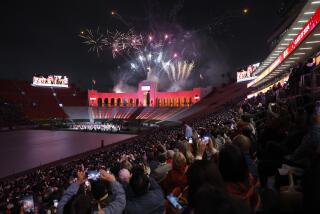Mayor’s Proposal to Split City Attorney’s Duties Rejected
Dealing another setback to Mayor Richard Riordan’s plans to retool the City Charter, the city’s appointed charter commission on Wednesday roundly rejected his proposal for reorganizing the city attorney’s office.
Riordan has aggressively lobbied for splitting the city attorney’s duties in two and having part of the office report to the mayor. Under Riordan’s proposal, the city’s chief prosecutor, who handles mostly misdemeanor cases, would still stand for election. But the leader of the office’s civil arm, which files and defends lawsuits on behalf of city government, would be appointed and report to the mayor.
Currently, City Atty. James K. Hahn is elected and responsible for both functions. The City Council has the authority to review and approve legal settlements, which the mayor has no power to review.
Despite lobbying commissioners in person and over the phone, Riordan has encountered stiff opposition, and on the eve of the commission’s discussion Wednesday, Hahn reiterated his objections in a long letter to the panel.
“Those who propose that the city attorney should report to the mayor argue that this will somehow increase the city attorney’s accountability,” Hahn wrote. “Such a proposal will increase the accountability of the city attorney to the mayor, but it is the people’s business that is being conducted and it is the people to whom the city attorney should account. . . . To suggest that the people are not capable of holding the city attorney accountable is to disregard direct democracy.”
That view was countered most forcefully at the commission hearing by Joseph D. Mandel, UCLA vice chancellor for legal affairs. Mandel argued the position advanced by the mayor--that having a city attorney whose client is not clearly defined as the executive branch burdens the legal process and makes it impossible for the mayor to rely on his legal advisors.
Under the current system, Mandel said in a memorandum to his colleagues, the city attorney “is empowered to substitute his or her substantive judgments to second-guess the judgments of the executive and legislative branches.”
The commission, however, was in no mood to adopt a Riordan-backed initiative. Even though several members conceded that the current system is flawed, they were loath to back the mayor.
“If the mayor was a mayor, that’d be something else,” said Commissioner Robert Wilkinson, a former City Council member. “This mayor . . . is only a figurehead for social events.”
Instead, the commission voted 12 to 3 in favor of preserving the city attorney post as an elected function overseeing a single office with civil and criminal divisions. The panel also rejected a motion to give the mayor authority to veto council-approved actions regarding city litigation.
The city’s elected charter commission, which is working on its own attempt to redraw the charter, has yet to vote on the city attorney’s office but could act on it as early as this week.
Meanwhile, a special group convened by elected commission President Erwin Chemerinsky at least for now has ended its attempts to negotiate a compromise over the contentious issue of neighborhood councils. Retired Judge William Norris, who headed that group, called its meetings productive and characterized by good will and mutual respect, but acknowledged that no agreements were reached.
“There was movement but not a resolution,” he said. Members of the group--which include labor, big business and homeowner organizations, among others--have agreed to discuss its work with their colleagues and may decide to meet again later, Norris added.
More to Read
Start your day right
Sign up for Essential California for news, features and recommendations from the L.A. Times and beyond in your inbox six days a week.
You may occasionally receive promotional content from the Los Angeles Times.







